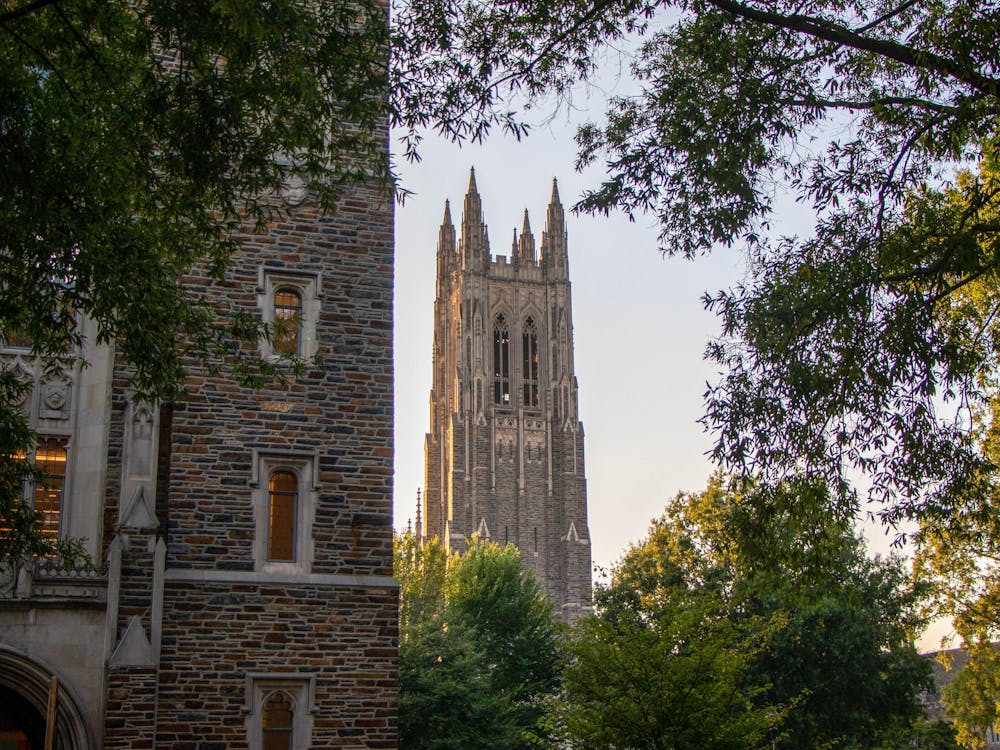Amidst rising tensions on college campuses around the country since the outbreak of the Israel-Hamas war, Duke is attempting to promote civil discourse through the Provost’s Initiative on the Middle East.
The year-long initiative, announced in a Feb. 12 email to students, faculty and staff by Provost Alec Gallimore, addresses the “need for learning and engagement” by hosting speaker events featuring scholars at Duke and outside experts who provide insight into the past and present of conflict in the region.
“The violence in the Middle East over the last four months has reverberated across our campus,” Gallimore wrote in the announcement. “… We must do more to ensure our campus environment makes space for rigorous and respectful debate involving people with differing opinions.”
Events are planned by a working group of 13 faculty members from across departments in the Trinity College of Arts & Sciences. Bruce Jentleson, William Preston Few distinguished professor of public policy, leads the initiative in partnership with Abbas Benmamoun, vice provost for faculty advancement, and Noah Pickus, associate provost and professor of the practice in the Sanford School of Public Policy.
Benmamoun hopes that bringing together a variety of perspectives and opinions will encourage students to foster more productive, educational and respectful conversations among one another.
He also expressed that, as an educational institution, Duke has a responsibility to provide the community with a resource — in addition to what departments and campus groups do — to both provide education on the Middle East and model a way for students and faculty to engage with controversial topics.
“If we, as educational institutions, cannot engage with these difficult topics, then that’s really not a good sign,” he said. “We need to be comfortable with dealing with difficult topics in a way that is welcoming to different views — where I can disagree with that person, but I can still respect that person.”
The faculty invited students with diverse perspectives to work in a Student Engagement Committee led by Mary Pat McMahon, vice provost and vice president of student affairs, that aims to foster ideas and gain feedback on different events and conversations put on by the initiative.
Junior Rachel Field, a member of the Student Engagement Committee, was participating in a peacebuilding program in Israel in the fall semester when the Oct. 7 attacks occurred. The program included students from a variety of backgrounds and used a “storytelling and emotionally vulnerable approach” to unpack students’ perceptions of the conflict in the Middle East.
“It was very challenging for me during dialogues sometimes,” Field said. “There were a lot of things that I didn’t know before or [that] I hadn’t realized the extent of before.
Nevertheless, she found the program to be “a really formative experience,” saying that “you really begin to understand what is going on when you love people from all sides.”
Since being evacuated back to the United States, Field has noticed increased polarization between opposing sides at Duke than she did in her program, which she finds “disheartening.” However, she thinks the initiative is helping to lessen the divide between the two by bringing together people with different perspectives, and she hopes this will happen more as time goes on.
Field noted that many students at Duke lack a comprehensive baseline of knowledge about the history of the Middle East, which might intimidate those looking to attend events hosted by the initiative. She also added that events that make space for students to engage in dialogue might help to break down barriers between groups of opposing opinions who currently “don’t talk to each other.”
“I think isolation is understandable, but it might not be the healthiest way forward,” Field said.
The initiative’s leaders are also working in consultation with the Center for Muslim Life, Jewish Life at Duke and academic programs in Trinity College with expertise on the Middle East.
Joshua Salaam, director and chaplain of the Center for Muslim Life, said that although many of the initiative’s events have already been planned, he has appreciated being consulted to ensure it meets the needs of the University’s community.
“As the Muslim Chaplain on campus, I’m here to feel the pain of the students, help the University listen and understand their viewpoints and support actions and efforts to keep the campus safe for everyone,” he said.
Joyce Gordon, director of Jewish Life at Duke, said that the events have been excellent models of open and civil discourse across differences.
“Students aren't going to draw the same conclusions from what they are hearing — I don't think that's the point,” Gordon said. “I feel that the initiative is about providing thoughtful opportunities for students to develop their own perspectives.”
Jentleson explained that while some student feedback has asked for certain “highly polarizing” figures, the initiative tends to avoid inviting speakers that may not be “helpful to the community.”
Get The Chronicle straight to your inbox
Sign up for our weekly newsletter. Cancel at any time.
Abdullah Antepli, associate vice president and associate vice provost for community-engaged research and teaching, said that he anticipates that some community members will be disappointed with the initiative, especially those who are “looking to the administration to take sides.”
“There is an expectation for the administration — Duke leadership — to fix this problem as if this is a fixable problem. There's always people who are fixers, they are looking for a solution. They want to put up these fires and they want this tension to go away,” he said. “They will be very disappointed because this … is not a fixable problem.”
Aseel Ibrahim is a Trinity sophomore and an associate news editor for the news department.

